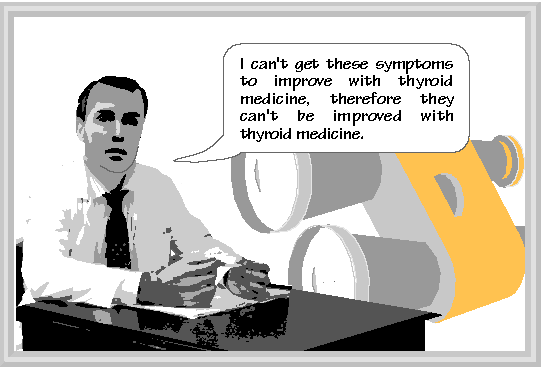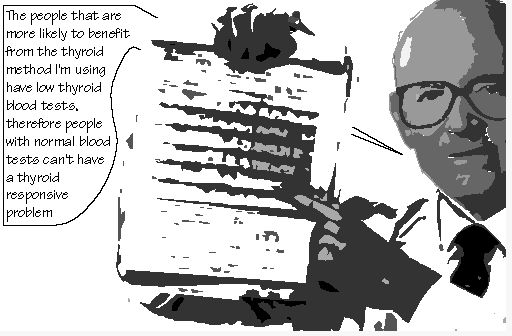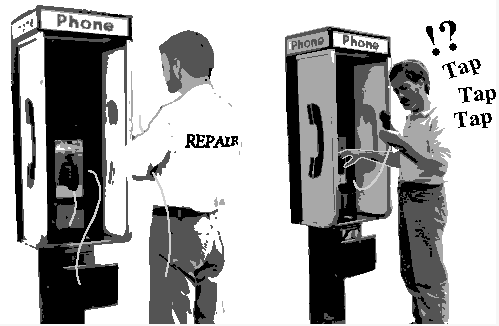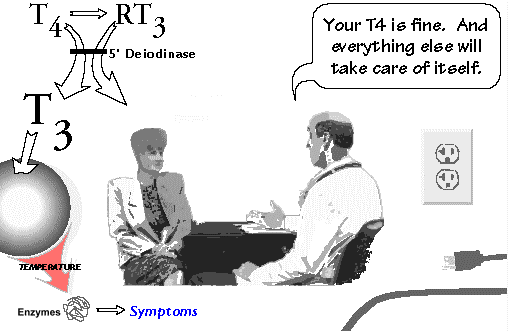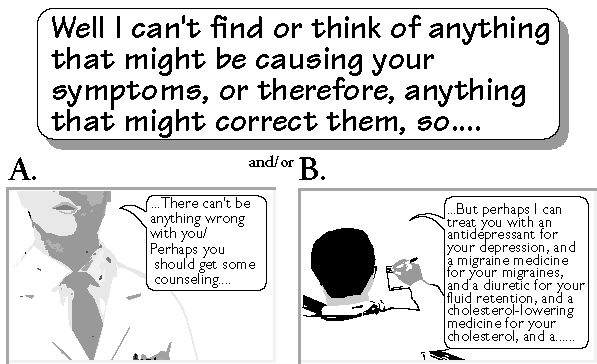Not necessarily.
Some faulty assumptions have played a major role in this condition being overlooked by so many for so long.
This condition has not been so easily recognized in the past, because doctors didn’t have a way to get it better.
It’s like looking through the big lenses of a pair of binoculars and concluding: “These are not useful for seeing long distances.”
And just like looking through the right end of a pair of binoculars makes all the difference, using the right thyroid medicine in the right way can also make all the difference.
Not necessarily.
Reinforcing the distraction was the observation that clinical improvement in patients who did improve with the thyroid treatment approach they were using at the time, correlated pretty well with thyroid blood test values.
The preceding assumption is like concluding, “Since pay-phones with severed receiver cords are most likely to benefit from having their cords replaced, phones without severed cords can’t have a problem that might benefit from repair.”
Note: As it turns out pay-phones with intact receiver cords may still not work properly, because something else might be broken like the coin mechanism. In fact, the coin mechanism is far more commonly the problem in pay-phones that are out-of-order, and it’s certainly possible for them to be repaired.
Just because a problem is more obvious doesn’t make it more common or more important. In a similar way, doctors have overlooked a far more common thyroid-responsive problem by preoccupying themselves with the ones that show up on thyroid blood tests.
What makes Wilson’s Temperature Syndrome so simple and so obvious is how typical the patients’ histories are before treatment, and how reproducibly and predictably their symptoms respond to proper T3 therapy.
The symptoms of Wilson’s Temperature Syndrome are no more varied, numerous, vague, or non-specific than are those of hypothyroidism (since they are the same). But no one would say the symptoms of hypothyroidism are insignificant.
It is easy to overlook more fundamental problems with greater numbers of more generalized symptoms, especially since such problems are typically difficult to diagnose and treat with much success.
But we must remember that some problems that affect a fundamental level of the body’s functioning can be very significant, and very easily treated. And the symptoms of Wilson’s Temperature Syndrome are no less treatable than those of hypothyroidism, when they are approached properly.
It should not be too difficult to understand how one problem can cause so many different symptoms: If a 20-story skyscraper loses the 20th floor due to an accidental explosion, then there is a problem with one floor. If that same skyscraper loses instead, the 1st floor in an explosion, then there is a problem with 20 floors.
Not necessarily.
It’s like concluding: “Well, I’ve hooked up and turned on the water line to this ice machine, therefore everything else will take care of itself.” Maybe not, what if it’s not plugged in, or if the cooling unit doesn’t get cold enough to convert the water to ice?
There is a lot more to the thyroid system than T4 production. The T4 must be converted to the active thyroid hormone T3 which then stimulates nuclear membrane receptors in the cells.
It should be clear to almost any doctor, that whatever can go wrong in the human body, does go wrong in someone, for some reason, at some time or another.
When possible, it’s always better to treat the problems instead of just the symptoms.
T3 is not a cure-all but in many cases it’s worth a try.
…Especially if it won’t take long (possibly a couple of hours, probably within a couple of days, and almost certainly within a couple of weeks) with a therapeutic trial, to see if the patient is responding well.
…Especially if when one does respond well, one often responds dramatically.
…Especially if there is a chance for “cure.” *
…Especially if there is little risk with a therapeutic trial.
…Especially if there’s a good chance patients can be far better along in a few weeks or months than they would otherwise be in years.
* Note: I don’t like to use the word cure in relation to Wilson’s Temperature Syndrome, however, because there is always a chance for a person to relapse, especially under conditions of stress; and treatment does not change one’s genetic predisposition toward having the problem.

